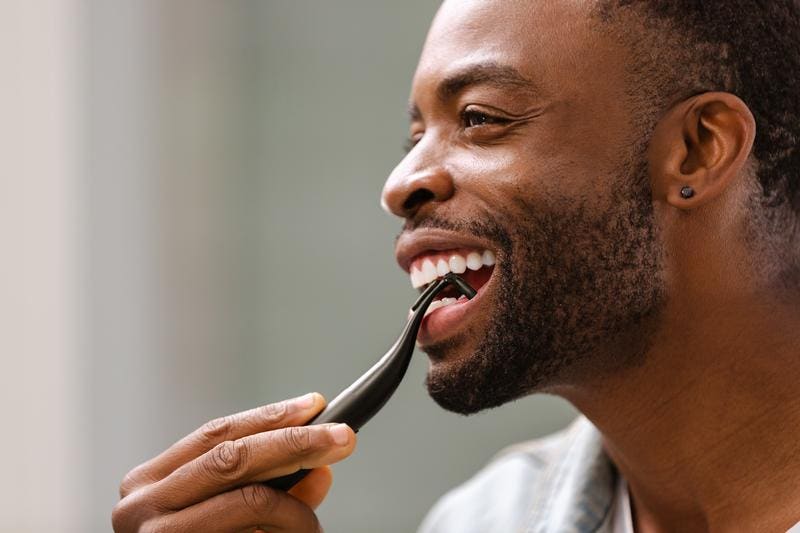One of the unsung applications of assistive technology is oral hygiene.
As is the case with exercise and weight, society has this obsession with maintaining perfectly straight and pearly white teeth, replete with the healthiest gums. From a health perspective, these all are good ideals. It’s good to have healthy teeth and gums. By the same token, however, striving for idealism isn’t always realistic. For many people with disabilities, myself very much included, to have the healthiest teeth and gums may literally not be possible. I once read somewhere that people with cerebral palsy have the worst dental health. This is largely because brushing one’s teeth oftentimes be an exercise in futility and frustration due to the motor skills involved in getting a toothbrush in and around the mouth. Less “careful” brushing leads to not-so-clean teeth and leads to a host of icky situations such as gingivitis and periodontal disease.
The salient point here is simply that no matter the desire to have healthy teeth, and to ward off the stigmas surrounding bad oral health, the reality is not everyone can care for their teeth in the correct way. In other words, this issue is not as much about laziness than it is about sheer function and ability. The same goes for flossing. No matter how much someone may want to do it, many times it’s just untenable to do so.
Enter Samantha Coxe and her team at Flaus.
On the company’s website, its product is easy to grasp: it’s an electric flosser that’s “like an electric toothbrush, but for flossing.” Flaus bills itself as a money-and time-saving solution to manual flossing, one that’s environmentally friendly, easy to use, and helps build healthy dental habits. The device utilizes 18,000 sonic vibrations and has three speed options, an ergonomic handle, and recyclable floss heads. Moreover, Flaus is waterproof, portable, and has the approval of “over 200 dental professionals” participating in the company’s ambassador program. Flaus costs $119 for a one-time purchase. A subscription lowers the price to $99 and includes the shipment of 90 floss heads to users’ doorstep every three months. That’s an accessibility aid unto itself, insofar as it’s cheaper and saves a disabled person from logistical and/or physical barriers in getting to a brick-and-mortar store to buy replacement heads.
In an interview with me conducted last week via videoconference, Coxe explained the impetus for starting Flaus came during her time practicing mergers and acquisitions law in New York. She told me about a dentist appointment caused her to “vigorously” start flossing the week before, despite being a faithful brusher. With a hefty bill in tow, Coxe began talking to friends and colleagues about flossing and decided to look for an electric flosser to make it easier and expedite the process. To her surprise, no such thing existed on the market. It was then when Coxe had her “lightbulb moment” that would eventually bore Flaus.
“Flossing is a massive pain point for almost every single person,” she said. “Of course, there are some people who love flossing every day, but over 70% of Americans do not floss daily. The pain points are unanimous across the board: it takes too long, it’s difficult to do, it’s painful, it’s gross, and it’s wasteful. That was really the moment that I realized that I had stumbled upon a massive market opportunity. Something that excited me the most was, up until this point, flossing is such a unsexy category in such an unsexy space. That got me excited about all the opportunities for innovation on the product side and the brand side.”
Coxe incubated Flaus for a year-and-a-half during the pandemic, all while still working at one of the most prestigious law firms in the nation in Skadden Arps. She went through approximately 250, 3D-printed prototypes, all of which involved Coxe “running around putting it as many people’s mouths” as she possibly could. In April 2021, she started an Indiegogo campaign to see if her idea could gain traction in the market. She knew, though, she couldn’t work on Flaus while also doing her duties practicing law. She resigned from the practice and launched the campaign. Coxe decided to devote all her time and energy on Flaus.
“I feel like I’ve been attached to this oral care rocketship ever since [leaving law],” Coxe said of working on Flaus. “It’s been an incredible journey—and a total 180 [turn] from being a lawyer, especially as someone with no engineering background and no dental background.”
Between venture capital funding and the Indiegogo campaign, Flaus has raised over $3.5 million to date.
A large portion of my conversation with Coxe revolved around her cognizance of the accessibility problems inherent to conventional flossing, as well as the subsequent empathy she has for those in the disability community who, like me, have longstanding problems with flossing well. In essence, Coxe endeavored to make Flaus more accessible (in more ways than one) in a way regular dental floss never was or ever will be. To wit, she told me she had an epiphany early on that Flaus had the potential to be “an incredible accessibility tool for those that have a dexterity impairment or a visual impairment.” She shared an anecdote about getting feedback from three Blind people who told her they’d always had problems flossing. The team, Coxe said, has “really leaned into” the accessibility merits of Flaus, saying the disability community is an “amazing” group. The team went to such lengths as teaching themselves Braille so as to include it on the packaging. There’s also a QR code that, when scanned, takes users to a how-to video on Flaus that features audio descriptions. Making the product packaging accessible admittedly made the company’s bill of materials rise, but the team were adamant about adhering to their ethos of inclusivity. Coxe called the Blind and low vision community “a huge subset of the population that has been quite honestly overlooked,” adding she relishes the opportunity to connect with them and make them feel represented.
“I’m really excited, as we continue to work with different customers in this community, to continue to make Flaus—both from a product perspective, but also from a packaging perspective, as accessible as possible,” Coxe said.
Asked about the aforementioned stigmas around pristine teeth and gums, Coxe told me Flaus exists to help people “pamper and accessorize and invest in their smiles as much as their teeth skin and hair,” telling me Flaus is uniquely positioned to help revolutionize the beauty space vis-a-vis oral care. Coxe said another goal of Flaus is to help break barriers and shatter stigmas about prioritizing beauty and so-called “proper” dental care. She called the concept of literally everyone having the straightest, whitest teeth “completely unrealistic,” likening it to “societal dysmorphia that one has [in terms of] what we’re supposed to be looking like that’s unobtainable for the average American.”
Looking towards the future, Coxe said she hopes Flaus can help everyone, notably children and the elderly, in using the flosser as a tool towards achieving healthier dental habits. More specifically, the long-term goal for Flaus is to get one in every bathroom in America. Coxe noted a moonshot project for the company is to someday create a device with interchangeable heads such that a person wouldn’t need the clutter of both an electric toothbrush and an electric flosser as discrete devices.
To Coxe, it’d be an all-in-one product. Again, accessibility unto itself.
“There’s so many different ways we [at Flaus] can continue to further push the oral care space to make it more accessible and easier to incorporate in your daily routine,” Coxe said. “Particularly starting with kids—that is really where these habits need to be starting, because it’s scary to think about what this generation’s gum disease and oral health [problems] is going to look like with how much sugar is in our food.”
Read the full article here









